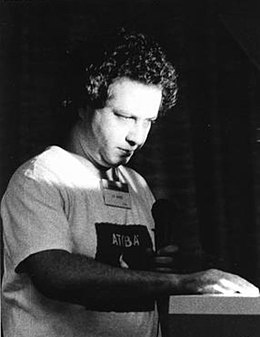Carlos Kenig
| Naissance | |
|---|---|
| Nationalités | |
| Formation | |
| Activités |
| A travaillé pour | |
|---|---|
| Membre de | |
| Directeur de thèse | |
| Site web | |
| Distinctions |
Carlos E. Kenig, né le à Buenos Aires, est un mathématicien argentino-américain, qui mène ses recherches dans le domaine de l'analyse.
Formation et carrière
[modifier | modifier le code]Kenig est scolarisé à Buenos Aires. Il a obtenu son doctorat en 1978 à l'Université de Chicago auprès d'Alberto Calderón avec une thèse intitulée spaces on Lipschitz Domains. Puis, il a été, de 1978 à 1980 instructeur à l'Université de Princeton, puis à l'Université du Minnesota, où il passe en 1983 professeur. À partir de 1985, il est professeur à l'Université de Chicago, où il est aujourd'hui professeur titulaire de la chaire "Louis Block Distinguished Service".
Kenig s'intéresse à l'analyse et aux équations aux dérivées partielles. Il a reçu en 2008 le Prix Bôcher pour ses travaux sur les équations aux dérivées partielles non linéaires dispersives, comme l'équation de Korteweg-de Vries ou l'équation de Schrödinger non linéaire. Dans l'éloge prononcé à la remise du prix sont cités ses travaux conjoints avec Frank Merle[1], Gustavo Ponce, Louis Vega[2] et Alex Ionescu[3].
En 2015, il est membre du comité consultatif scientifique de l'Institut de mathématiques Clay.
Parmi ses étudiants notables, figurent Zhongwei Shen (en), Kin Ming Hui, Gigliola Staffilani et Panagióta Daskalopoúlou.
Prix et distinctions
[modifier | modifier le code]Kenig a obtenu une Bourse Guggenheim et une Bourse Sloan. Il est fellow de l'American Mathematical Society. Il a été conférencier invité au Congrès international des mathématiciens à Berkeley en 1986 (Carleman estimates, uniform Sobolev inequalities for second order differential operators and unique continuation theorems) et à celui de Pékin en 2002 (Harmonic measure and "locally flat" domains). Il a été élu en 2002 à l'Académie américaine des arts et des sciences. En 2010, il a prononcé une conférence plénière lors du Congrès international des mathématiciens à Hyderabad (The global behaviour of solutions to critical non-linear equations de dispersion). En 1984, il a reçu le Prix Salem. En 2008 il est lauréat du Prix Bôcher « pour ses importantes contributions à l'analyse harmonique, aux EDP, et aux EDP dispersives non linéaires » . En 2014, il a été élu à l'Académie nationale des sciences[4]. Kenig a été lauréat en 2017 des Colloque Lectures de l'American Mathematical Society. Il a été élu en juillet 2018 président de l'Union mathématique internationale pour la période 2019-2022.
Publications
[modifier | modifier le code]- Carlos Kenig, Harmonic analysis techniques for second order elliptic boundary value problems, AMS, .
- Carlos Kenig, Jean Bourgain et Sergiu Klainerman, Mathematical aspects of nonlinear dispersive equations, Princeton University Press, .
- Carlos Kenig, Luca Capogna et Loredana Lanzani, Geometric Measure- geometric and analytic points of view, AMS, .
- Carlos Kenig et Panagiota Daskalopoulos, Degenerate Diffusions: Initial Value Problems and Local Regularity Theory, EMS Tracts in Mathematics, .
- Cora Sadosky et Alberto Calderón, Harmonic Analysis and Partial Differential Equations: Essays in Honor of Alberto Calderón, University of Chicago Press, (ISBN 0-226-10456-7).
- Luis Vega et G. Ponce, Smoothing effects and local existence theory for the generalized nonlinear Schrödinger equations, vol. 134, Invent. Math., , p. 489–545.
- L. Escauriaza et Vega, Ponce, Uniqueness properties of solutions to Schrödinger equations, vol. 49, Bull.Amer. Math. Soc., (lire en ligne), p. 415–442.
Notes et références
[modifier | modifier le code]- Kenig, Merle, Global well-posedness, scattering and blow-up for the energy critical focusing non-linéaire wave equation, vol. 201, Acta Math., , p. 147-212.
- Kenig, G. Ponce et L. Vega, Well-posedness scattering and results for generalized Korteweg-de Vries equations via the contraction principle, vol. 46, Comm. Pure Appl. Math., , p. 527–620.
- Kenig, Ionescu, Global well-posedness of the Benjamin-Ono equation low regularity spaces, vol. 20, J. Amer. Math. Soc., , p. 753–798.
- « http://www.nasonline.org/news-and-multimedia/news/april-29-2014-NAS-Election.html »(Archive.org • Wikiwix • Archive.is • Google • Que faire ?)
Liens externes
[modifier | modifier le code]
- Site officiel
- Ressources relatives à la recherche :
- Page à l'Université de Chicago
- Annonce de l'obtention du Prix Bocher
- Obtention du Bocher Prix, Notices de l'AMS 2008, Fichier pdf
- Carlos Kenig: The energy critical wave equation. Série de conférences sur les "Leçons Hadamard", en 2016, (angl.)
Text is available under the CC BY-SA 4.0 license; additional terms may apply.
Images, videos and audio are available under their respective licenses.


